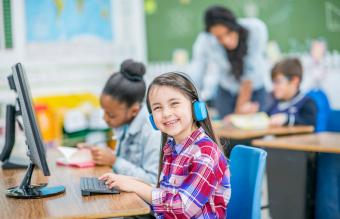
A report card helps you keep track of the skills your child will need to learn and those he has mastered in kindergarten. Some states even require that a record be kept of the work your child has done, so make it fun with a free, bright and exciting report card. Click on the image to download, customize, and print the editable report card you like best. Use the Adobe guide if you have any trouble using the free printables.
Basic Kindergarten Report Card Template
If you want a basic report card, you can update a printable preschool progress report to include kindergarten skills or you can print this standard fillable kindergarten report card. A traditional kindergarten report card includes all the standard subjects like math, reading, writing, and science. There's room to add a grade for each quarter and special notes.

Created by Inês Saldanha for Love To Know Owned by LoveToKnow. Copyright by LoveTo Know Traditional Kindergarten Report Card
Customized Kindergarten Report Card Template
Whether you're schooling on your own at home or as part of a larger homeschool group, report cards help kids and parents track goals in a non-threatening way. A fun kindergarten skills checklist can help get kids excited about seeing their progress on a report card.

Kindergarten Report Card Template for a Religious Curriculum
If you're using a faith-based curriculum, this religious report card template can help you track skills related to things like Bible learning and understanding God.

Created by Inês Saldanha for Love To Know Owned by LoveToKnow. Copyright by LoveTo Know Faith Based Curriculum Report Card for Kindergarten
Tips to Personalize the Report Cards
Since each category and skill on the report card is editable, you can add in whatever subjects and skills your child is focusing on at the time. In a public school setting, report cards are generally sent out quarterly, but you could update it monthly or even weekly.
- Insert the student's name to make it feel more personal and official.
- If your homeschool has a name or you work in cooperation with other homeschooling families, add that in for a professional feel.
- Change the title of each section to reflect your curriculum if they're different from those listed. If you end up with a few extra sections, use them to provide more detailed notes or keep track of special achievements and awards.
- Turn the date or quarter (Q1) columns in each section into "yes" or "no" spaces to make it a checklist.
- Use the same template to create report cards for almost any elementary grade, updating the skills accordingly.
Skills for Kindergarten
Typical kindergarten skills can be found in your homeschool curriculum or by taking inspiration from national programs such as Common Core or Next Generation Science Standards. For skills related to personal and social growth, you can align goals with standard milestones for your child's age. Decide which skills to focus on for the upcoming school year in your lesson plans and make sure they're on the report card. Then you can fill in the dates as the skills are achieved. This helps keep you on track for teaching while also gauging your child's progress.
Kindergarten Grading
If you want to provide overall grades, you can use either a number or letter system. Add a key to the "notes" section showing what each letter or number represents if needed.
- Letter systems for this grade level typically don't follow the traditional A, B, C, D, and F model. Instead use letters like "S" for Satisfactory, "NI" for Needs Improvement, or "I" for independent.
- Kindergarten number grades also don't often follow the 0 to 100 model. For standard-based learning, 1 equals Not Meeting Expectations (for their grade level) and 4 equals Exceeds Expectations.
- Discuss your grading system with your child frequently so they understand how to read the report card too.
- Review the report card with your child and ask comprehension questions such as, "Which skills do you think you need to practice more?" and "How can you practice this skill?"

Keeping Records for a Report Card
Record keeping and documentation is an important part of homeschooling. Place report cards and other special documents in a binder or tote bin labeled with your child's name so you'll know where to find them.







